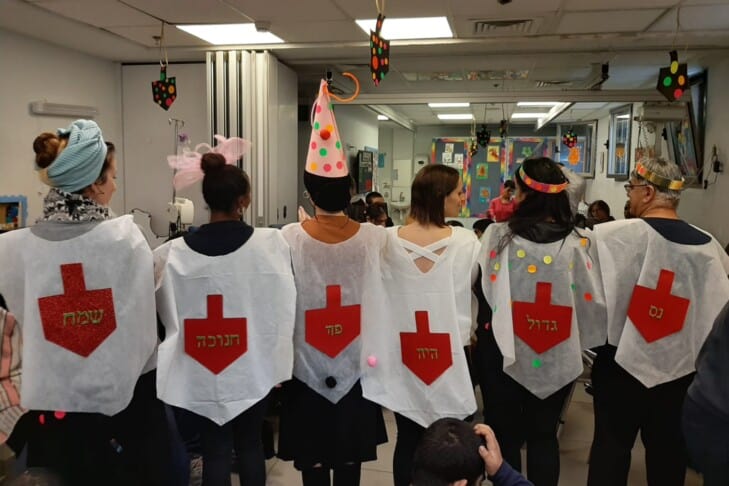Students at Marblehead’s Epstein Hillel School put a new twist on pen pals this fall, creating sensory-friendly Hanukkah cards for new friends across the world at ADI rehabilitation care centers in Israel. ADI—from the Hebrew word for “radiant jewel”—offers residential and outpatient care for severely disabled people. Kids receive hydrotherapy, buzz around in motorized cars instead of wheelchairs, play with therapy horses, read in tactile libraries and more. ADI also aims to boost disability awareness with partner schools all over the world.
As part of that initiative, their ADI Bechinuch Disability Inclusion Program is a yearlong curriculum for Jewish schools. Using art and science, kids understand how disabilities affect daily life. Epstein Hillel became an ADI Bechinuch partner school immediately following Jewish National Fund-USA‘s Israel Mission for educators this past summer, when Head of School Amy Gold toured and fell in love with ADI Negev-Nahalat Eran, the organization’s 40-acre rehabilitation village in Israel’s south. Epstein Hillel third-grade teacher and STEM coordinator Lea Winkler leads the school’s ADI program.
“Our school’s identity is welcoming, and we want students to understand that people can be different and be a part of our community. We want to make sure our kids see that these different identities and differences don’t keep us from being together but allow us to better understand each other. Differences don’t have to keep us apart,” she says.

The ADI curriculum also contains immersive lessons where kids can simulate the experiences of their Israeli friends, such as trying to solve a puzzle wearing a blindfold or working one-handed.
“As a part of my science curriculum, I teach about sound and light. As a piece of that, students learn about the ears and the eyes. We talk about deafness and blindness. and how can we make different accessible technologies that we use in life accessible to everyone, so it’s a perfect partnership,” she says.

As part of their lesson on art therapy, kids worked at the school’s Sulman Innovation Lab, an art studio and STEM center, to construct sensory, 3D Hanukkah cards with tactile, traceable elements like beads, sequins and feathers.
“This was also our first Hanukkah event of the year. The kids were excited about Hannukah and were then excited to be able to share that with other people,” Winkler says.
Their carefully made cards were shipped overseas before Thanksgiving. Next, she’ll work with middle-schoolers to design accessible objects, such as cutting boards and Purim costumes for wheelchair-users.

In upcoming months, ADI Bechinuch partner schools will take virtual tours of ADI Jerusalem and ADI Negev-Nahalat Eran. In February, the schools will also participate in ADI’s “Make the Change Challenge,” an international STEM accessible design contest to mark Jewish Disability Awareness, Acceptance and Inclusion Month (JDAIM).
“The kids have been so enthusiastic and excited about this, because it’s connected to real people—the fact that someone who has this need, who’s going to be getting what they make, is really exciting for them,” Winkler says.




